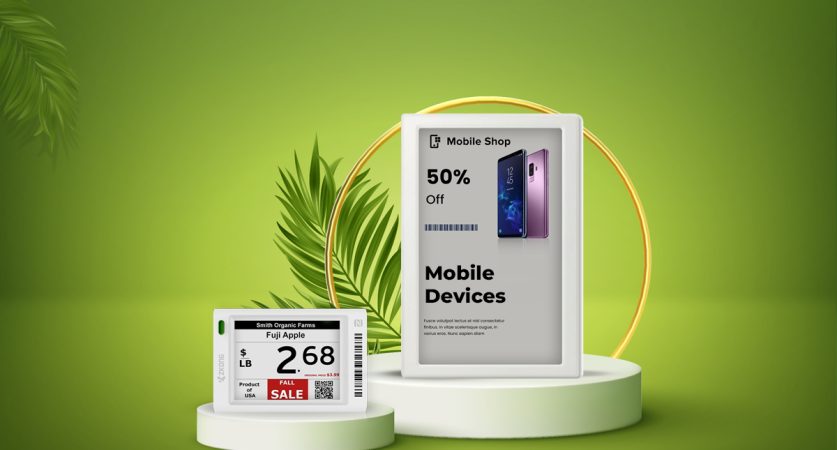Revolutionizing Retail with Electronic Shelf Labeling: A Comprehensive Guide to Shelf Labels

In the ever-evolving landscape of retail, staying ahead of the curve is paramount. It’s all about improving customer experiences, enhancing operational efficiency, and increasing overall profitability. One of the game-changing innovations in this domain is Electronic Shelf Labeling (ESL). In this comprehensive guide, we’ll delve into the world of ESL, explore its benefits, and understand how it’s revolutionizing the retail industry.
Understanding the Power of Shelf Labels
Before we dive into the exciting world of Electronic Shelf Labeling, let’s first establish a solid foundation by understanding the significance of traditional shelf labels. Shelf labels are an essential part of any retail store. They provide critical information to shoppers, guiding them through their purchasing decisions. Additionally, they serve as a crucial tool for store management, helping to maintain an organized inventory.
Traditional shelf labels are paper-based and require frequent manual updates. While they’ve served their purpose well for many years, they do have certain limitations. These limitations include the time and resources required for constant upkeep, potential for human error in labeling, and the inability to adapt to rapid price changes or promotions.
The Revolution Begins: Electronic Shelf Labeling (ESL)
Electronic Shelf Labeling (ESL) represents a monumental shift in the retail landscape. ESL systems replace the traditional paper labels with electronic displays that can be updated remotely and in real-time. This technology is based on wireless communication, making it possible for store owners to manage and update pricing and product information effortlessly.
Benefits of Electronic Shelf Labeling
Let’s take a closer look at the myriad benefits ESL offers to the retail industry:
- Real-Time Price Updates: With ESL, retailers can change prices and display promotions instantaneously. This flexibility ensures that customers always see the most up-to-date pricing information.
- Error Reduction: Eliminating the need for manual label changes significantly reduces the chances of pricing errors, which can lead to customer dissatisfaction and financial losses.
- Improved Efficiency: Store employees can spend more time assisting customers and less time updating labels. This increases operational efficiency and enhances the overall shopping experience.
- Price Consistency: ESL ensures consistent pricing across all channels, eliminating discrepancies between in-store and online prices.
- Inventory Management: ESL systems can be integrated with inventory management software, helping retailers keep track of stock levels in real-time.
- Customer Engagement: ESL can display additional product information, reviews, and even personalized offers, enhancing customer engagement and interaction.
- Environmental Sustainability: The reduction in paper usage and waste is not only cost-effective but also eco-friendly.
The Technology Behind ESL
Electronic Shelf Labeling systems are an amalgamation of cutting-edge technology. These labels typically consist of a digital display, a microcontroller, and wireless communication capabilities.
The microcontroller acts as the brain of the label, processing and displaying the relevant information. It is connected to a central management system through a wireless network. This allows retailers to update information on the labels remotely, whether it’s changing prices, displaying promotions, or updating product details.
Wireless communication plays a pivotal role in ESL. It ensures that the information on the labels is always in sync with the central management system. Whether it’s a small convenience store or a large supermarket, the scalability of these systems is unparalleled.
How ESL is Transforming Retail
- Enhancing the Shopping Experience
Electronic Shelf Labeling takes customer experience to the next level. Shoppers can easily access accurate and up-to-date information about products, prices, and promotions. This transparency builds trust and loyalty.
- Price Agility and Competitive Advantage
Retail is highly competitive, and the ability to change prices rapidly is a significant advantage. ESL allows retailers to respond to market dynamics swiftly, offering competitive pricing and staying ahead of the competition.
- Reducing Operating Costs
Although the initial setup cost for ESL can be significant, the long-term savings are substantial. Labor costs decrease as manual label changes become a thing of the past, and fewer pricing errors mean fewer losses.
- Inventory Management and Stock Control
ESL systems can be integrated with inventory management software, ensuring that stock levels are accurate. Retailers can monitor inventory in real-time, preventing overstocking or understocking issues.
- Personalized Marketing and Upselling
Electronic Shelf Labeling systems have the capability to display additional product information, reviews, and even personalized offers based on a customer’s preferences and shopping history. This enables retailers to upsell and cross-sell effectively.
- Environmental Sustainability
Reducing paper usage has environmental benefits. ESL not only reduces paper waste but also contributes to a store’s sustainability efforts.
- Omni-Channel Integration
In an age of online shopping, maintaining consistent pricing between physical stores and e-commerce platforms is vital. ESL ensures that pricing is uniform across all channels, enhancing the omnichannel retail experience.
Challenges and Considerations
While the advantages of Electronic Shelf Labeling are clear, it’s essential to acknowledge some of the challenges and considerations associated with its implementation:
- Initial Cost: The initial investment for ESL systems can be substantial. Retailers need to assess the ROI carefully.
- Training: Employees need to be trained in using the ESL system effectively.
- Integration: Integrating ESL with existing inventory management and pricing systems can be complex and time-consuming.
- Battery Life: ESL labels require power to function, and their battery life can vary. Managing battery replacement schedules is necessary.
- Data Security: As ESL systems rely on wireless communication, ensuring data security is crucial.
Case Studies: ESL Success Stories
Let’s take a look at a few case studies to better understand how Electronic Shelf Labeling has positively impacted various retail businesses.
1. Amazon Go
Amazon Go, the cashier-less convenience store, relies heavily on technology to streamline the shopping experience. ESL plays a pivotal role by displaying prices, product information, and personalized recommendations. The real-time updates ensure that customers are always aware of the cost of their selections, contributing to the store’s innovative and frictionless shopping model.
2. Carrefour
Carrefour, one of the world’s largest retail chains, implemented ESL across many of its stores. This decision drastically reduced pricing errors and improved the overall efficiency of the staff. Customers can now easily identify promotions, discounts, and product details, resulting in a more enjoyable and transparent shopping experience.
3. Decathlon
Decathlon, a global sporting goods retailer, has embraced ESL to enhance its inventory management. The system helps keep track of stock levels in real-time, allowing Decathlon to optimize its supply chain, reduce waste, and better serve customers. The efficiency gains from ESL have been instrumental in managing their vast range of sports and outdoor equipment.
4. Media Markt
Media Markt, a leading European consumer electronics retailer, uses ESL to stay competitive in the fast-paced electronics market. They can respond quickly to price changes and offer promotions on the fly, ensuring that their pricing is always aligned with customer expectations.
The Future of ESL in Retail
The future of Electronic Shelf Labeling in retail is incredibly promising. As technology continues to evolve, ESL systems will become even more sophisticated. Here are some of the exciting trends and developments on the horizon:
- Integration with IoT: ESL will become an integral part of the Internet of Things (IoT) ecosystem, enabling retailers to gather valuable data and insights for better decision-making.
- SHARES
- [shared_counts]

Ashmawi Sami has a Bachelor degree in Travel and Tourism Management from the University of Minnesota. He has his own travel vlogging channel. Besides being a fantastic yoga instructor he has travelled to 9 countries and planning his next trip soon. As the father of 3 dogs, he is well-trained in parenting, crowd control, and crisis situations.
ABOUT ME

Gillian is a freelance blogger, student, and full-time traveler. Each day she spends her time exploring something exciting to help people find the information they need while travelling to a new destination. Whether it be the place to enjoy holidays, or a spot to throw a party or hidden gems that you must visit in the city.
ALL CATEGORIES
- Adventure (13)
- Automotive (8)
- Business (724)
- Education (13)
- Event (4)
- Health (286)
- Insurance (11)
- Lifestyle (12)
- News (1)
- Real Estate (19)
- Shopping (26)
- Technology (23)
- Travel (8)

JOIN US TODAY
POPULAR POST
January 27, 2021 -
Adventure Travel For The Audacious Spirit
January 27, 2021 -
Small Business Loans for Women
January 27, 2021 -
Adventure Tours in Vanuatu
RECENT POST
July 10, 2025 -
Precision Engineered Fasteners: Trusted Manufacturers in India
India has firmly established its recognition as a...
July 10, 2025 -
Premium Super Duplex, Titanium and Copper Nickel Products for Industrial Excellence
As worldwide industries evolve, the call for superior...
July 10, 2025 -
Top copper product manufacturer in India: Quality you can trust
Copper is one of the maximum critical metals...
July 10, 2025 -
Premium Quality Metal Components from Triton Metal & Alloys
Triton Metal & Alloys, a leading metal and...





